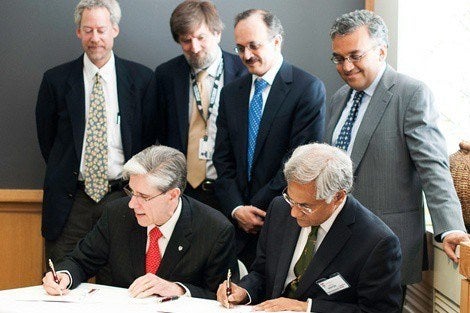May 24, 2013 — India faces daunting public health challenges. Maternal and infant mortality rates are high. Malaria and tuberculosis persist stubbornly. Noncommunicable diseases such as diabetes and cancer are prevalent and increasing. And many—especially the poor—lack good and affordable health care.
Keshav Desiraju, Secretary of Health for the Ministry of Health and Family Welfare in India, and Harvard School of Public Health (HSPH) faculty gave an overview of India’s current and future public health challenges at an HSPH seminar on May 9, 2013. Introducing Desiraju, HSPH Dean [[Julio Frenk]] said he is described by colleagues “as a visionary and a man of action, with enormous capacity to articulate complex ideas.”
Secretary Desiraju’s talk featured the signing of a memorandum of understanding (MOU) between India’s Ministry of Health and Family Welfare and HSPH, which formalizes a closer working relationship between the School and the Ministry on a variety of public health issues. Ties between HSPH and India are longstanding, said [[Wafaie Fawzi]], chair of the HSPH Department of Global Health and Population (GHP).
“Many of us at the school—faculty, students, and staff—have had the privilege of working with institutions and partners in India for mutual benefit on issues of critical importance to global health such as the impact of urbanization, the effectiveness of health interventions, and issues around nutrition research and training,” Fawzi said.
This spring, HSPH initiated the “HSPH-India Health Partnership,” coordinated by [[Peter Berman]], professor of the practice of global health systems and economics in GHP. Greater collaboration with India’s Ministry of Health will be an important component of new partnership activities, and HSPH faculty and Ministry officials hope that working more closely together can help them address India’s many health challenges.
Others who spoke at the event included [[David Hunter]], HSPH dean of academic affairs, who discussed using edX the not-for-profit open-source online learning platform created by Harvard and MIT, as a platform to greatly expand access to public health education in India; [[Ashish Jha]], professor of health policy and management, who expressed his hope for a two-way learning process in the partnership between HSPH and the Ministry; and [[Christopher Duggan]], associate professor in the Department of Nutrition, who discussed the importance of the role of nutrition in boosting public health in India.
Infectious and noncommunicable diseases
“India has made progress in recent years toward improving the health of its people but still has much work to do,” Desiraju said. For instance, Save the Children’s State of the World’s Mothers report for 2013, released May 7, 2013, reported that 300,000 babies in India die every year within 24 hours of birth. “This is a very sad record,” he said.
While malaria and tuberculosis rates have decreased over time, many people still become infected each year and Indian health officials are particularly worried about the spread of drug-resistant tuberculosis. “It affects at least 60,000 people, and the suspicion is that the number is possibly more,” Desiraju said.
Noncommunicable diseases such as diabetes, cardiovascular disease, and cancer are also growing problems. Ovarian and breast cancer among women, and oral cancer—caused mostly by chewing tobacco—are widespread. Other diseases, including sickle cell anemia, rheumatic heart disease, thalassemia (a genetic blood disorder) and leprosy still affect significant numbers of people.
Stubborn health care challenges
Desiraju also outlined issues with India’s health care system, a combination of public and private services. Often, large numbers of patients seek care at district hospitals because they can’t get satisfactory treatment at clinics near their homes. Large sections of North India lack adequate numbers of qualified health care professionals. And, because half of India’s medical colleges are privately run and expensive, many graduates can’t afford to work in the public health service, where pay is lower compared with the private sector. Desiraju said Indian officials hope to soon offer systematic university-level training of community health workers who are best suited to work in underserved areas.
In the future, India must pay more attention to regulating the nation’s large generic drug industry, Desiraju said. There’s also ongoing debate about the prospect of universal health care in India—what exactly it would entail and how it would be implemented. Other issues—nutrition, hygiene and sanitation, provision of clean and safe drinking water, domestic violence, security for women in public spaces, neglect of children, malnutrition—must also be addressed.
India’s many public health challenges are complicated by economic conditions in the country. “The relative failure of school education systems to equip young persons to enter the world of work, lack of employment opportunities, the widening gap between rich and poor, and the complete marginalization of the most vulnerable sections of the country, make it even more difficult for us to secure a healthy India,” Desiraju said.
“It is clear we are looking at very major health challenges,” he said. Dealing with these challenges will involve “changing mindsets and changing human nature.”
photo: Aubrey LaMedica
